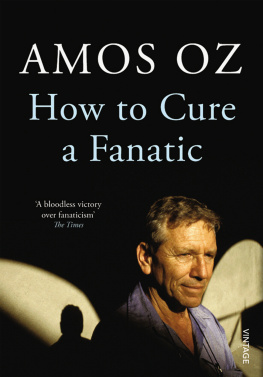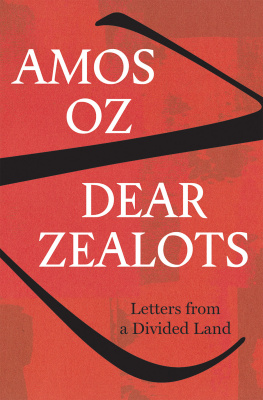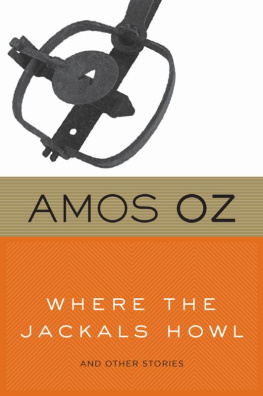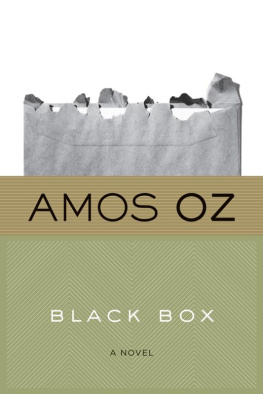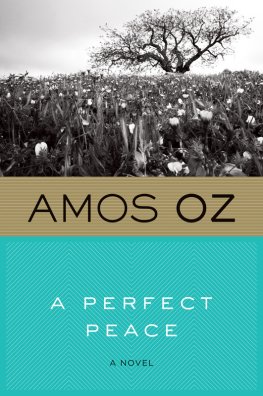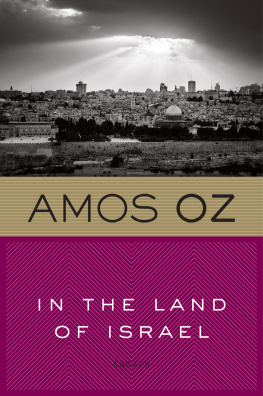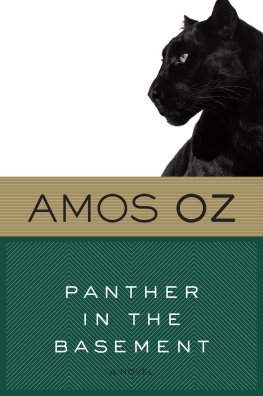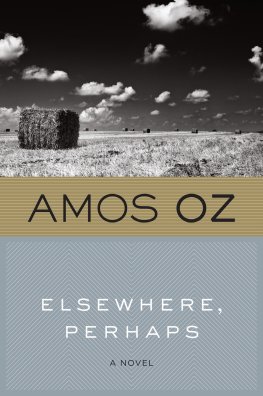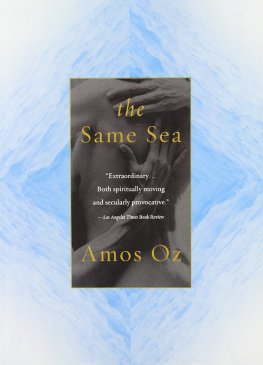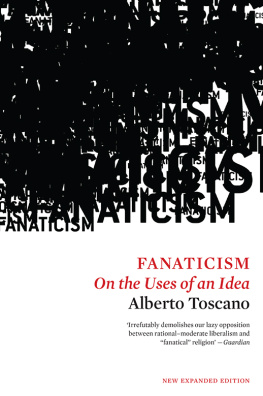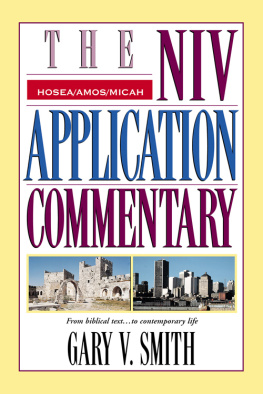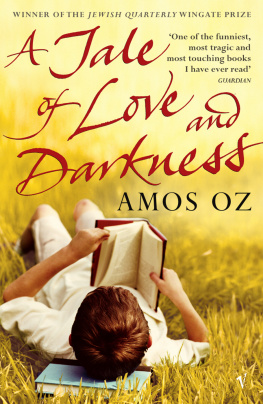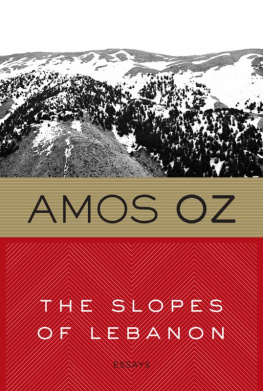Contents
About the Author
Born in Jerusalem in 1939, Amos Oz is the internationally acclaimed author of many novels and essay collections, translated into over 30 languages, including his brilliant semi-autobiographical work, A Tale of Love and Darkness. He has received several international awards, including the Prix Fmina, the Prix Mditerrane tranger, the Israel Prize and the Frankfurt Peace Prize. He lives in Arad, Israel.
About the Book
Internationally acclaimed novelist Amos Oz grewup in war-torn Jerusalem, where as a boy he witnessed first-hand the poisonous consequences of fanaticism.
In How to Cure a Fanatic Oz analyses the historical roots of violence and confronts truths about the extremism nurtured throughout society. By bringing us face to face with fanaticism he suggests ways in which we can all respond.
ALSO BY AMOS OZ
Fiction
My Michael
Elsewhere, Perhaps
Touch the Water, Touch the Wind
Unto Death
The Hill of Evil Counsel
Where the Jackals Howl
A Perfect Peace
Black Box
To Know a Woman
Fima
Dont Call It Night
Panther in the Basement
The Same Sea
A Tale of Love and Darkness
Rhyming Life and Death
Suddenly In the Depths of the Forest
Scenes from Village Life
Non-fiction
In the Land of Israel
The Slopes of Lebanon
Under this Blazing Light
Israel, Palestine & Peace
This ebook is copyright material and must not be copied, reproduced, transferred, distributed, leased, licensed or publicly performed or used in any way except as specifically permitted in writing by the publishers, as allowed under the terms and conditions under which it was purchased or as strictly permitted by applicable copyright law. Any unauthorized distribution or use of this text may be a direct infringement of the authors and publishers rights and those responsible may be liable in law accordingly.
Version 1.0
Epub ISBN 9781784700690
www.randomhouse.co.uk
Published by Vintage 2012
2 4 6 8 10 9 7 5 3 1
Copyright Amos Oz 2004 updated material 2012
Foreword copyright Nadine Gordimer 2004
Amos Oz has asserted his right under the Copyright, Designs and Patents Act 1988 to be identified as the author of this work
First published in Great Britain by Vintage in 2004 as Help us to Divorce.
Vintage
Random House, 20 Vauxhall Bridge Road,
London SW1V 2SA
www.vintage-books.co.uk
Addresses for companies within The Random House Group Limited can be found at: www.randomhouse.co.uk/offices.htm
The Random House Group Limited Reg. No. 954009
A CIP catalogue record for this book is available from the British Library
ISBN 9780099572725
Foreword by Nadine Gordimer
AMOS OZ IS the voice of sanity coming out of confusion, the lying, hysterical babble of world rhetoric about current conflicts. In the brilliant clarity of How To Cure a Fanatic he analyses the twisted historical roots that produce the evil flower of violence, seeded again and again. He brings us to face the nature of fanaticism, its evolution. He doesnt offer a cure-all.
But, he convinces irrefutably that the Israeli-Palestinian conflict is Not a religious war, not a war of cultures, not a disagreement between two traditions, but simply a real-estate dispute over whose house this is. And he is not afraid to stake his vision and politico-moral integrity in the belief that the dispute can be resolved. Between Right and Right is a down-to-ground solution for which he advocates the necessity of imagination in what human beings in certain situations basically need in order to begin to define and respect each others space. The ironic humour with which he illuminates the vitally serious makes it all the more telling.
Publishers Note
THESE ESSAYS WERE originally delivered as speeches in Germany in 2002. They have been edited here for the English-language edition. They are followed by a Postscript written in 2003, on the publication of the Geneva Accords and which formed part of an article that appeared in a slightly different version in the Guardian, 17 October 2003.
BETWEEN RIGHT AND RIGHT
Between Right And Right
WHO ARE THE good guys? Thats what every well-meaning European, left-wing European, intellectual European, liberal European always wants to know, first and foremost. Who are the good guys in the film and who are the bad guys. In this respect Vietnam was easy: the Vietnamese people were the victims and the Americans were the bad guys. The same with apartheid: you could easily see that apartheid was a crime and that the struggle for equal, civil rights, for liberation and for equality and for human dignity was right. The struggle between colonialism and imperialism, on the one hand, and the victims of colonialism and imperialism, on the other hand, seems relatively simple you can tell the good guys from the bad. When it comes to the foundations of the Israeli-Arab conflict, in particular the Israeli-Palestinian conflicts, things are not so straightforward. And I am afraid I am not going to make things any easier for you by saying simply: these are the angels, these are the devils, you just have to support the angels and good will prevail over evil. The Israeli-Palestinian conflict is not a Wild West movie. It is not a struggle between good and evil, rather it is a tragedy in the ancient and most precise sense of the word: a clash between right and right, a clash between one very powerful, deep and convincing claim and another very different but no less convincing, no less powerful, no less humane claim.
The Palestinians are in Palestine because Palestine is the homeland and the only homeland of the Palestinian people. In the same way in which Holland is the homeland of the Dutch, or Sweden the homeland of the Swedes. The Israeli Jews are in Israel because there is no other country in the world which the Jews, as a people, as a nation, could ever call home. As individuals, yes, but not as a people, not as a nation. The Palestinians have tried, unwillingly, to live in other Arab countries. They were rejected, sometimes even humiliated and persecuted, by the so-called Arab family. They were made aware in the most painful way of their Palestinianness, they were not wanted as Lebanese, or as Syrians, or as Egyptians, or as Iraqis. They had to learn the hard way that they are Palestinians, and thats the only country which they can hold on to. In a strange way the Jewish people, just as the Palestinian people, have had a somewhat parallel historical experience. The Jews were kicked out of Europe; my parents were virtually kicked out of Europe some seventy years ago. Just like the Palestinians were first kicked out of Palestine and then out of the Arab countries, or almost. When my father was a little boy in Poland, the streets of Europe were covered with graffiti, Jews, go back to Palestine, or sometimes worse: Dirty yids, piss off to Palestine. When my father revisited Europe fifty years later, the walls were covered with new graffiti, Jews, get out of Palestine.
People in Europe keep sending me wonderful invitations to spend a rosy weekend in a delightful resort with Palestinian partners, Palestinian colleagues, Palestinian counterparts, so that we can learn to know one another, to like one another, to drink a cup of coffee together, so that we will realise that no one has horns and tails and the trouble will go away. This is based on a widespread sentimental European idea that every conflict is essentially no more than a misunderstanding. A little group therapy, a touch of family counselling, and everyone will live happily ever after. Well, first I have bad news for you: some conflicts are very real, they are much worse than a mere misunderstanding. And then I have some sensational news for you: there is no essential misunderstanding between Palestinian Arab and Israeli Jew. The Palestinians want the land they call Palestine. They have very strong reasons to want it. The Israeli Jews want exactly the same land for exactly the same reasons, which provides for a perfect understanding between the parties, and for a terrible tragedy. Rivers of coffee drunk together cannot extinguish the tragedy of two peoples claiming, and I think rightly claiming, the same small country as their one and only national homeland in the whole world. So, drinking coffee together is wonderful and Im all for it, especially if it is Arabic coffee which is infinitely better than Israeli coffee. But, drinking coffee cannot do away with the trouble. What we need is not just coffee and a better understanding. What we need is a painful compromise. The word compromise has a terrible reputation in Europe. Especially among young idealists, who always regard compromise as opportunism, as something dishonest, as something sneaky and shady, as a mark of a lack of integrity. Not in my vocabulary. For me the word compromise means life. And the opposite of compromise is not idealism, not devotion; the opposite of compromise is fanaticism and death. We need a compromise. Compromise, not capitulation. A compromise means that the Palestinian people should never go down on its knees, neither should the Israeli Jewish people.
Next page
